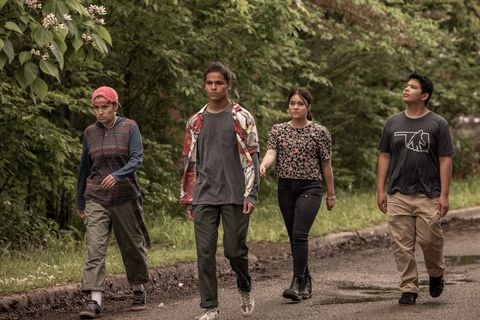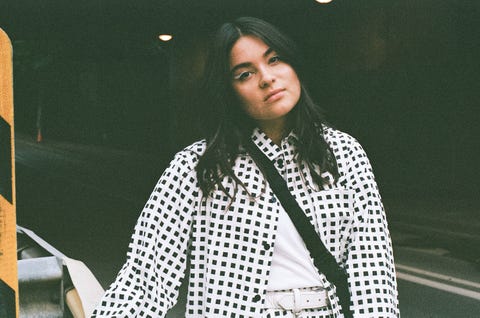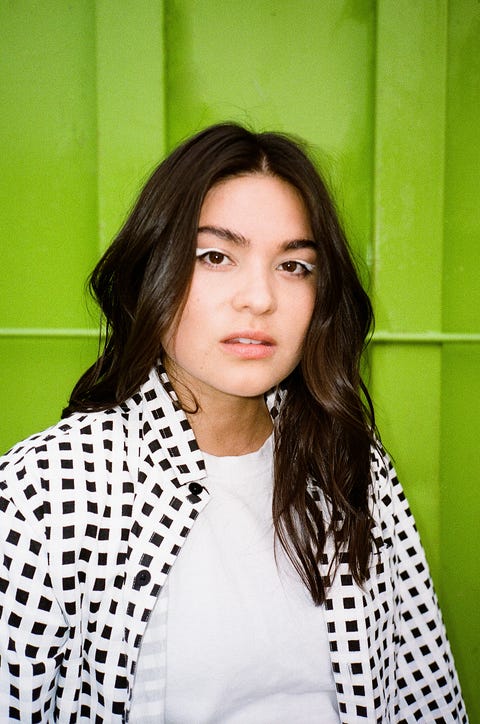“I grew up inherently political and fueled with Mohawk pride.”
Resistance and revolution have always been instinctive to actress Kawennáhere Devery Jacobs. Like so many BIPOC women across the globe, the 28-year-old has a passion for creating space for her community and dismantling the systems that hold back many women like herself. Though we chat to discuss her role in the groundbreaking new show, Reservation Dogs, Jacobs is sure to shed light on missing Indigenous women, protests to build a pipeline in Minnesota, and the need to portray two-spirit folks on screen. “It’s so funny when I’m asked about which specific issues I’m passionate about and want to bring attention to; they’re all interwoven,” she tells ELLE.com on Zoom.
Jacobs, who grew up on Kahnawà:ke Mohawk Territory in Quebec, has long focused on community-based efforts outside of her love for acting and filmmaking. She founded the Kahnawà:ke Youth Forum where she led and organized protests and rallies. She was also an active participant in the Idle No More Movement. And as her star rises in Hollywood, she continues to honor her people and culture. “I grew up surrounded by language and culture and such a sense of pride of who I am and where I came from,” Jacobs says.
After starring in the 2013 award-winning film Rhymes for Young Ghouls and shows like American Gods and Canada’s The Order, Jacobs now plays Elora Danan Postoak, one of four lead characters in FX’s new dark comedy Reservation Dogs. Created by Sterlin Harjo and Taika Waititi, the series follows a group of four Indigenous teens who live on an Oklahoma reservation while working—sometimes unconventionally—toward their dream of a better life in California.
Although the series is not an outright political commentary, the underlying subtext of the show mirrors that of the lives of many young people of color: that our existence is inherently political. Who we are and the environments that shape us all tell a larger unspoken story. “We’re not monoliths,” Jacobs says. “We have 500 plus different nations and tribes across Turtle Island, let alone Indigenous people across the world.”
Amidst the calls for better representation in Hollywood, Reservation Dogs is one of the rare shows challenging the one-dimensional portrayals of Indigenous cultures we often see on screen. It doesn’t just “check the boxes” of representation. There are also Indigenous people working behind the scenes, behind the camera, and in the writers’ room—and that’s exactly how it should be. The series helps viewers understand “that Indigenous folks are still here and we’re complex and we’re funny and we’re thriving and we’re healing and we’re celebrating our stories because we have so much to share,” Jacobs says.
ELLE.com sat down with Jacobs and discussed the need to create more shows centered around two-spirit identity, the fight to stop the Line 3 pipeline, and how she prepared for the season finale of Reservation Dogs.
Reservation Dogs is such an incredible series. What was it like wrapping up season 1 on your last day of filming?
Sterlin had gotten each of us a blanket and had wrapped me in it. I was just an inconsolable, blubbering mess. There was a moment at the end of season 1, and I am not even an emotional person, but it just meant so much and felt like it was something that I’ve been fighting my entire career for. There was just a sense of relief like, “We did it. We accomplished what we set out to do,” and that was to tell the truth of our community and to honor the story of Daniel and where Sterlin’s from. For me, just to be able to play a character alongside my fellow Rez Dogs, I was so emo about it. It was so overwhelming.
You and your costars have a brother-sister bond that is so authentic and genuine on screen. How did you build that over the course of shooting?
Very similarly to Elora Danan, I feel like a big sister to them. Although I feel like I’m way less moody than Elora is, and I’m not nearly as badass as her. But they didn’t need much support. I let them know that I was there if they needed, especially during the pilot with Lane [Factor, who plays Cheese]; this was his first audition ever and his first time acting. But they didn’t even need training wheels. They hopped on board and were just taking off running and are so great and such kind people and funny as hell. I have nothing but love for D’Pharaoh [Woon-A-Tai, who plays Bear], for Paulina [Alexis, who plays Willie Jack], and Lane, and the rest of the cast and crew. It was really awesome to be able to work with them.
You’ve mentioned that the hardest thing for you was leaving your reservation because in your community, family is a measure of wealth.
When people picture a reservation, or in Canada we call them reserves, they envision the images that they’ve seen in the media, which are among the poorest reservations in North America, when that’s not actually the case for all people. We’re not monoliths. We have 500 plus different nations and tribes across Turtle Island, let alone Indigenous people across the world. My community, Kahnawà:ke, borders a major city, Montreal. I had the best of both worlds, where I grew up on the dead end of a dirt road in the middle of the bush, and I could also drive for 20 minutes and be in downtown Montreal. I had a lot of access and because we were so close to a major city, there was a lot of economic prosperity in my community and the standard of living is pretty much on par with mainstream Canada.
For many of those reasons, a lot of hardships that other Indigenous communities face is not felt as deeply on my rez. I grew up in a place that was so proud of being Kahnawà:ke. I grew up in the legacy of the 1990 Oka Crisis, which is when the Mohawk nation had a 78-day standoff with the Canadian army. I grew up inherently political and fueled with Mohawk pride. My grandmother was principal of the Mohawk Immersion Elementary School, and me and my younger sisters attended an adult immersion Mohawk program. So, I have fluent speakers of Mohawk in my family.
I grew up surrounded by language and culture and such a sense of pride of who I am and where I came from that I never saw a reason to leave. I didn’t think that I needed to. My leaving Kahnawà:ke was more in pursuit of this career and this life that I wanted to live than it was trying to run away from something. Whereas it is the case for Elora in Reservation Dogs. [She had a] deep-seated belief that that place was the reason, and one of the contributing factors as to why Daniel [her late best friend] couldn’t handle it. This place killed him, is what Elora says. That was a little bit difficult delving into Elora and feeling that sense of disdain and needing to escape from the place that you came from, because my experience and upbringing was so different from hers. But when I was able to find my way, it was so powerful, and it really flooded me with Elora.
Without giving too much away, what do you think lies ahead for Elora in season 2?
For Elora, but for everyone else as well, I think we’re going to see a greater scope of the world than we currently have. There is so much that happens in Indigenous communities that the writer’s room is bubbling over with ideas of what to do, because this is one of the first opportunities, we’ve been afforded to explore our worlds and tell our stories. For me, growing up in my community, our weekend was a huge time of drama, and competition, and flashiness, and snagging, and hooking up, and everything in between. There’s so much in this world that we’ve only scratched the surface of. In season 2, I’m really looking forward to seeing more of this town and the world that these kids are growing up in.
Throughout the show there are underlying messages surrounding environmentalism, land rights, and people impeding on Indigenous land. Outside of the show you’ve been very vocal about how these issues overlap.
That’s so true. It’s so funny when I’m asked about which specific issues I’m passionate about and want to bring attention to, they’re all interwoven. Whether it’s the issue of missing and murdered Indigenous women, whether it’s the issue of pipelines—right now the Line 3 pipeline is being built and there are so many Indigenous water protectors and land defenders who were fighting against it. There are so many overlapping components to it: It’s environmental because it is uprooting earth and it is extracting oil and is unsustainable for the environment. It’s a human rights issue because if and when the pipeline bursts, it’ll affect the drinking water of millions of people. It’s also an Indigenous rights issue because it’s impeding on and going against the treaty rights that were formed in that territory. Whether it’s land, whether it’s Indigenous rights, whether it’s issues that our community faces, they are all rooted and are interwoven with each other. They’re one and the same.
I completely agree. I think there is rarely equal media attention given to any of those human rights violations, even though they all intersect on colonialism.
Yes, and I would say Stop Line 3 is one of them. In the territories where there are oil fields, which are typically in areas with high Indigenous population, the women and two-spirit folks from those communities experience violence at a staggering rate versus areas that did not have oil fields and “man camps.” The issue of Line 3 would be one that I’d like to push for, as well as the issue of missing and murdered Indigenous women, but also residential schools and Indian boarding schools. Over a thousand bodies have been found of Indigenous children who were forcibly removed from their homes and made to attend these schools so that they could “kill the Indian and save the man.”
I don’t think it’s getting nearly enough media attention. … It’s a very heavy subject, but it’s American history and it’s important. It’s North American history. So often in the U.S., stories of Indigenous folks being modern are erased, and I firmly believe that we cannot move forward in a positive way towards healing if not for acknowledging the history of what’s happened to Indigenous peoples in North America.
It also applies to North American education and politics and school curriculum, because that’s where the erasure starts and then it kind of funnels into the media. Which is why it is great to have a show like Reservation Dogs.
It’s wild to see how much media has an impact on people and their interest in learning about history. And Reservation Dogs isn’t necessarily a political show; we don’t have conversations like that. It’s about kids living their lives and mourning the fifth member of their group and their best friend, Daniel. But it’ll still have lasting impacts by creating visibility for Indigenous folks. I look at shows like Watchmen—because we filmed Reservation Dogs in Okmulgee, which is the capital of Muscogee Creek Nation in Oklahoma, and also culturally in Tulsa, Oklahoma, and I know that because we filmed in Tulsa and I had learned a lot about the area. Even in Oklahoma and in Tulsa, the Tulsa massacre on Black Wall Street [wasn’t included in the school curriculum] until [after] it aired on Watchmen with Regina King. Which is honestly astounding and ridiculous. But I will say that the media had that impact, and the media forced that place to hold a mirror to itself. That’s what I think Reservation Dogs has the potential to do in North America and America specifically, to show that Indigenous folks are still here and we’re complex and we’re funny and we’re thriving and we’re healing and we’re celebrating our stories because we have so much to share.
Right. And I think it would be great if we can get to a space for communities of color to tell intersectional stories, which is something you’ve been vocal of, particularly seeing more two-spirit stories.
Absolutely. In Reservation Dogs we do have someone who is two-spirit a part of the show. While we’re not having conversations about identity, I think that it has such an influence on our world and in the show inadvertently. I had the opportunity to work with Tommy Pico, who is a writer and who is out and queer. Also had the privilege of working with Sydney Freeland, who is trans, and Navajo, and queer. Also Elva Guerra, who’s two-spirit, non-binary, who plays the role of Jackie. While we’re not overtly having conversations [about sexual identity on the show], it seeps into the fabric of the world of what we’re creating and it’s just so beautiful.
Unfortunately, I got used to being the only Indigenous person on set, let alone the only queer Indigenous person on set. And being a part of a show like Reservation Dogs was such a sigh of relief. We could just take a breath, we all knew what we were doing, we had a shorthand because we understood what we were trying to make, and we just got to do it. There was no explaining, or second guessing, or having to cater and spoon-fed to a non-Indigenous audience. We just got to make the shit we wanted to make.
This has been such a transformative year for you. Do you have any new projects that we can keep an eye out for?
Yes! I am also a filmmaker and Sterlin Harjo knew me because he saw my short film that I’ve written and directed. You can stay tuned for more projects that I’ll be working on in front of and behind the camera. The next project that I’m going to have coming out will be released in early 2022. I also voiced an animated series that I’m really excited about, it’s called ARK: The Animated Series, based on the video game. I act alongside Zahn McClarnon, who plays Big in Reservation Dogs. But also, I work with legendary icons who I just completely geeked out over when I was cast. People like Elliot Page and Michelle Yeoh and David Tennant and Gerard Butler and Vin Diesel as well as Madeleine Madden, who is an Indigenous Australian actress. It’s an exciting series. I’m a big fan of animated shows and anime!
This interview was edited and condensed for clarity.
This content is created and maintained by a third party, and imported onto this page to help users provide their email addresses. You may be able to find more information about this and similar content at piano.io


